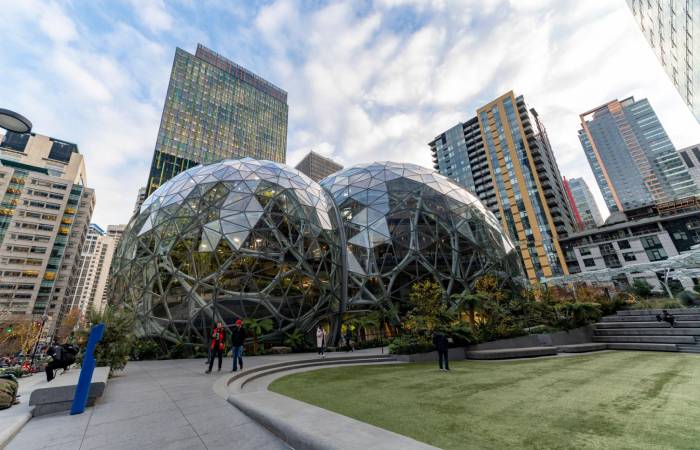Table of Contents
Introduction
Amazon is a global technology and e-commerce enterprise known as one of the world’s largest and most leading companies.
History and Founding of Amazon:
Jeff Bezos established Amazon, and its history goes back to July 5, 1994. Here’s a transitory synopsis of the history and founding of Amazon:
Founding (1994):
Jeff Bezos, a previous Wall Street executive, originated Amazon in his garage in Seattle, Washington.
The company’s original name was “Cadabra,” however, Bezos changed it to “Amazon.com” after the Amazon River in South America. Subsequently, the name change was inspired by the gigantic scale of the river, reflecting Bezos’s vision for the company.
Amazon Online Bookstore (1995):
On July 16, 1995, Amazon officially launched its online bookstore.
It began with a focus on selling books due to their widespread appeal and the availability of titles.
Amazon Diversification (Late 1990s):
The company rapidly expanded its product offerings beyond books to include music, movies, and other consumer goods.
The company’s speedy growth & expansion led to its initial public offering (IPO) on May 15, 1997.
Introduction of Amazon Prime (2005):
Amazon Prime, a subscription service proposing free two-day shipping on eligible items, was introduced in 2005.
AP expanded its inventory to include Prime Video & Prime Music services.
Amazon Kindle and E-Readers (2007):
In 2007, it presented the Kindle, the first e-reader, transforming the book industry by promoting digital reading.
Jeff Bezos’ Leadership (1994-2021):
Jeff Bezos operated as the CEO of Amazon from its founding until he stepped down in 2021.
Under Bezos’ leadership, Amazon became known for its customer-centric approach, innovation, and aspiring long-term vision.
Leadership Transition (2021):
By February 2021, Jeff Bezos pronounced his step down as CEO, and Andy Jassy, the former head of AWS, prospered as CEO.
The history of Amazon is categorized by its advancement from an online bookstore to a global e-commerce giant with a varied range of products and services. Additionally, the company’s ability to adjust to changing markets, invest in technology, and maintain a customer-focused strategy has underwritten its success.
Business Segments of Amazon:
Amazon functions in various business segments, incorporating e-commerce, cloud computing, digital streaming, consumer electronics, and more. Here are some of the significant business segments of Amazon:
- E-Commerce:
Amazon’s chief business is its e-commerce platform, selling distinct products, including books, electronics, apparel, and more.
The company permits third-party sellers to use its platform for their products.
- Amazon Web Services (AWS):
AWS is a cloud computing platform offered by the company. It provides diverse services, including computing power, storage, databases, machine learning, and analytics.
AWS is a noteworthy contributor to Amazon’s general revenue and profit.
- Digital Media:
It offers digital media services, including Prime Video, Music, and Kindle.
- Consumer Electronics:
The company has developed its line of consumer electronics, including Kindle e-readers, Fire tablets, Echo smart speakers, and more.
- Amazon Prime:
AP is a subscription service providing various benefits, including free shipping, access to Prime Video, Prime Music, and other perks.
Amazon’s Impact and Influence:
The company has had an insightful impact on several industries and has become a leading force in the global economy. Its influence extends across e-commerce, technology, cloud computing, and more. Here are a few known aspects of Amazon’s impact and influence:
- Market Capitalization:
It has constantly been one of the most valuable publicly traded companies, with an enormous market capitalization.
- Disruption of the Retail Industry:
Amazon’s e-commerce platform has considerably disrupted the old-style retail industry, leading to the deterioration of many brick-and-mortar stores.
- Innovation and Technology:
The company emphasizes innovation and investing in evolving technologies, including artificial intelligence, robotics, and drone delivery.
- Customer-Centric Approach:
Amazon’s focus on customer satisfaction and convenience, illustrated by features like one-click ordering and Prime, has set new standards for customer service in the digital era.
- Digital Media and Entertainment:
The Prime Video has emerged as the foremost competitor in the streaming industry, creating original content and perplexing traditional entertainment providers.
What are Amazon’s Controversies?
Amazon has confronted remarkable controversies, including concerns over warehouse working environments. Remarkably, reports have stressed labor issues, with claims of demanding schedules, intense productivity expectations, and limited breaks for employees.
Consequently, the company has faced disparagement for treating delivery drivers and alleged anti-union practices. In addition, Amazon’s market dominance has led to antitrust scrutiny, with alarms about biased competition and its impact on smaller businesses.
Environmental concerns have increased due to the carbon footprint linked with its massive logistics network. These controversies have sparked public disputes about labor practices, corporate responsibility, and the role of tech giants in the economy.
Miscellaneous Facts about Amazon:
The company brags several stimulating facts, including its iconic emblem featuring an arrow from A to Z, signifying its extensive product range. The company’s Seattle headquarters, known as the “Day 1” building, accentuates a culture of innovation.
Jeff Bezos chose “Amazon” to convey scale, inspired by the vast Amazon River. The first item sold on the platform was a book—Douglas Hofstadter’s “Fluid Concepts and Creative Analogies.”
Furthermore, Amazon Echo’s voice-activated assistant, Alexa, has become a domestic name. With diverse achievements like Zappos and Whole Foods, the company incessantly expands its influence across various industries, showcasing its adaptability and vision.
Conclusion:
In conclusion, Amazon is a universal juggernaut that has transformed retail and commenced innovations across industries. From its modest origins as an online bookstore, the company, under the leadership of Jeff Bezos, has evolved into a multifaceted giant with a vast product ecosystem.
Furthermore, Amazon’s customer-centric approach, disruptive technologies like AWS, and iconic services such as Prime have reformed consumer expectations.
However, the company is not without controversy, facing scrutiny over labor practices and antitrust concerns. Despite this, Amazon’s impact on e-commerce, cloud computing, and digital entertainment remains supreme, solidifying its status as a crucial player in the ever-evolving tech landscape.

